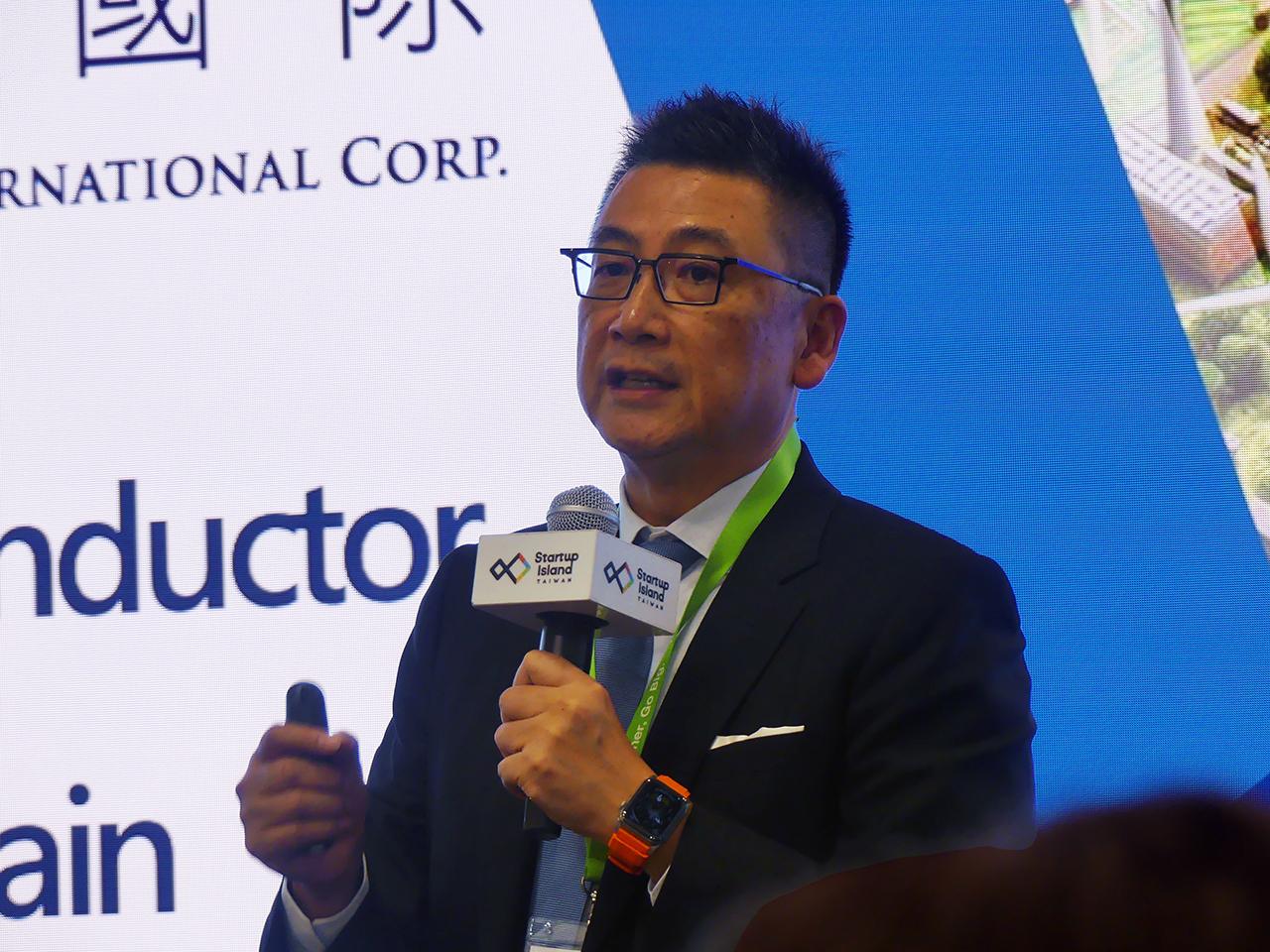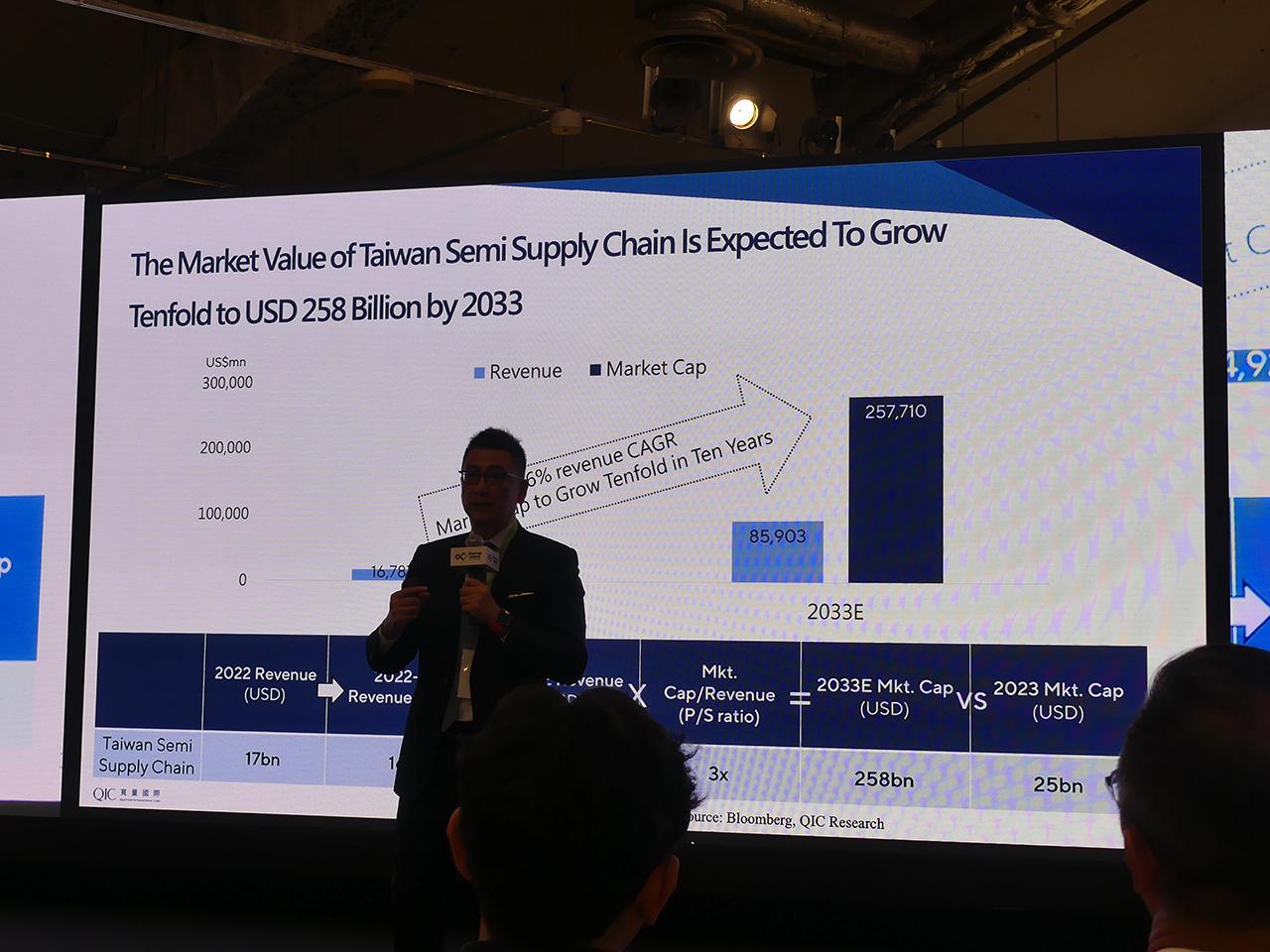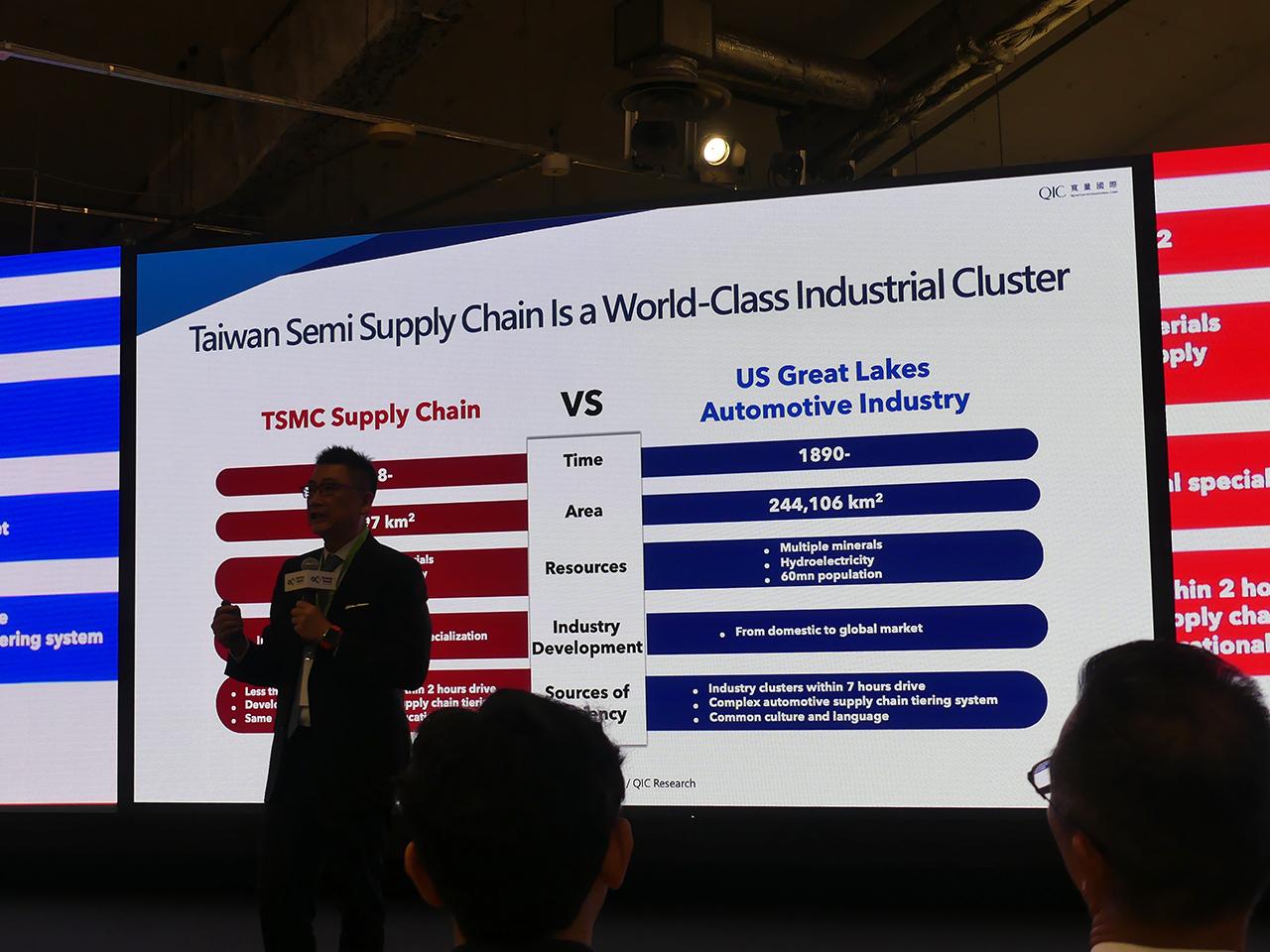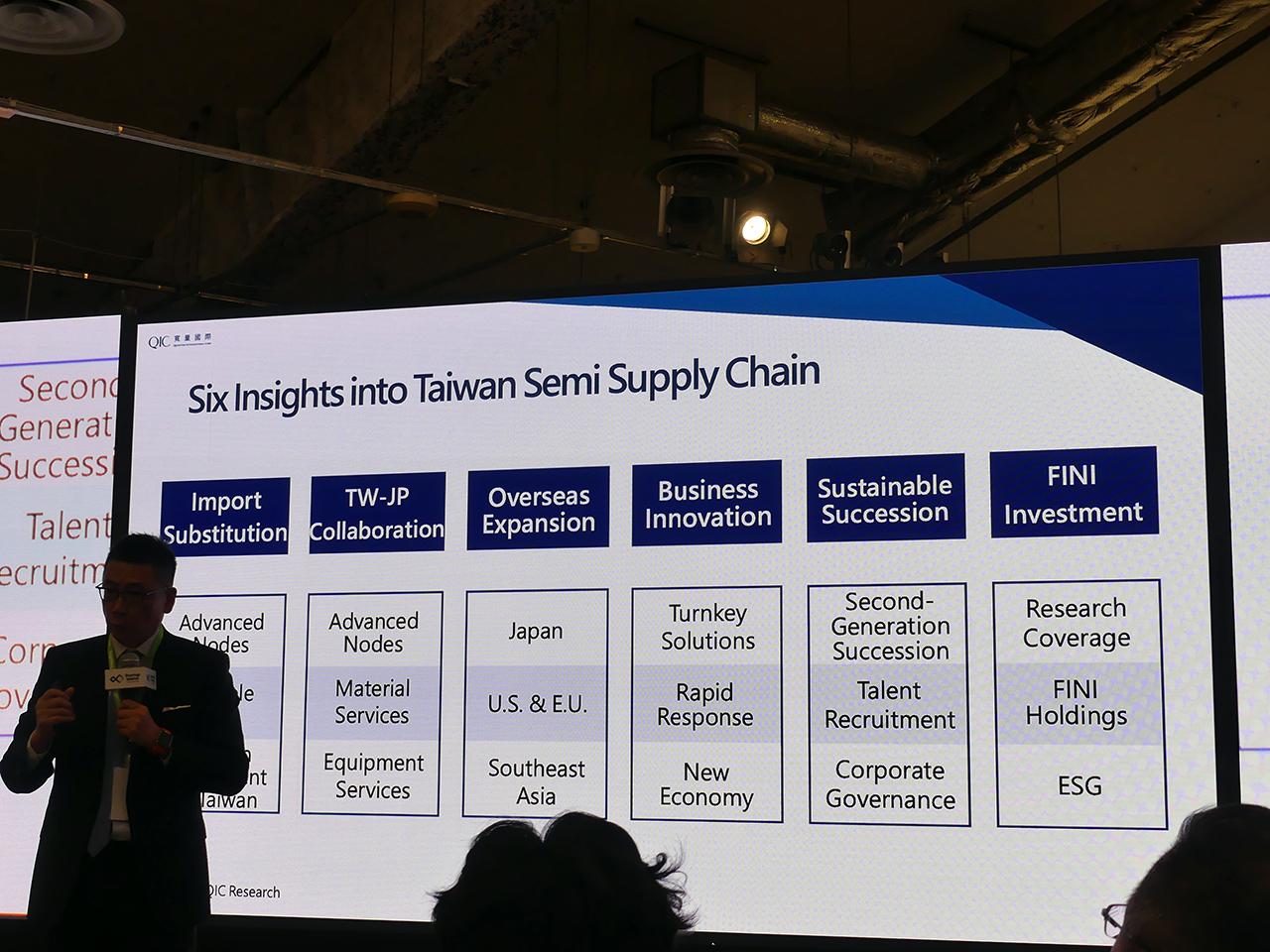TSMC's supply chain to see market capitalization increase tenfold by 2033. But Japan's support is still essential
Taiwan's TSMC is at the heart of the world's semiconductor industry. The company has grown to a market capitalization of over 100 trillion yen, and companies that support its supply chain are also benefiting from this growth.
By 2033, the market capitalization of TSMC's suppliers may grow tenfold to $258 billion (approximately 37 trillion yen)... There is still room for Japanese companies to enter this market.
This topic was raised by Alex Lee, founder, and CEO of QIC (Quantum International Corp.), Taiwan's first independent financial advisory firm, at the 2024 Japan-Taiwan Innovation Summit, a startup event held in mid-September that brought together around 1,000 participants from a variety of sectors, including about 70 Japanese and Taiwanese startups, as well as politics and industry.

TSMC Supply Chain to See 10x Market Cap by 2033
TSMC, the world's largest semiconductor manufacturer, had a market capitalization of more than $900 billion as of September 26. According to Lee, TSMC's profits are expected to reach about NT$1 trillion (JPY 4.5 trillion) in 2024, roughly one-third of the profits of all listed companies in Taiwan.
TSMC's market value is supported not only by investment from Taiwan, but also by international investors. Currently, 80% of TSMC's investment comes from international investors, "which is also why we continue to promote TSMC in Tokyo and around the world," Lee said.
TSMC is also expanding its business by working with 800 to 1,000 suppliers.
QIC researched 49 listed companies in Taiwan that are part of TSMC's supply chain in 2023. As a result, the market capitalization of these companies is currently about $29.4 billion (about 4.2 trillion yen), and the average annual sales growth rate is 136%, and it is expected to grow about tenfold to $258 billion (about 37 trillion yen) by 2033.

QIC plans to increase the number of companies it researches to approximately 80 in the future and monitor their growth trends.
Not only TSMC, but many other companies involved in the supply chain have already received large amounts of international investment.
According to QIC, the TSMC supply chain event provided an opportunity for companies to meet with more than 1,000 international investment firms, which resulted in attracting not only financial but also strategic investments. The total market capitalization of these companies listed on the Taiwan Stock Exchange increased by more than 20%.
However, Lee noted that "we expect there to be significant differences in the size and growth rates of semiconductor-related companies over the next three to five years," and that what's important is not the growth of stock prices, but how these companies will leverage the capital markets to achieve further growth.
The value of having a domestic semiconductor supply chain
TSMC's supply chain construction began in earnest around 2017, and the company succeeded in securing the resources it needed on its own.
Lee gives the example of the American automobile industry. The key to the success of the automobile industry that developed around the Great Lakes in North America in the 1890s was that it developed the industry domestically without relying on external resources. He says a similar phenomenon can be seen in Taiwan.
"Most of the 800-plus companies involved with TSMC communicate face-to-face with decision makers, which is very efficient. When engineers work together, they speak Chinese and sometimes Taiwanese, and don't need to use English or Japanese.
"Even if a problem occurs, (Taiwan is small) we can meet face-to-face and solve the problem within two hours, and we can communicate quickly. Their generation and the next generation are also graduating from the same universities in Taiwan, and their children are also growing up in the same way," said Lee.
Lee said the next step for TSMC will be how it brings the power of its supply chain to its next market.

Lee said more than 95% of the companies in TSMC's supply chain have relatively small market capitalizations, but the Taiwanese stock market has invested heavily in them, with some going from less than $200 million in assets to approaching $1 billion.
Semiconductor industry: an opportunity for Japanese companies

Lee cited several common factors among successful companies in this industry, the first of which is "import substitution . "
"The process of getting TSMC's certification usually takes more than six years, which will allow us to serve other customers," Lee said.
Taiwanese suppliers are well equipped to meet TSMC's stringent requirements by using state-of-the-art facilities to manufacture and test products.
The second is "collaboration between Japan and Taiwan . "
"Over the past 30 years, Taiwan's semiconductor industry has relied on technological and capital support from Japan. Support from Japan, including capital and technological cooperation, is essential ," Lee said.
TSMC is now looking to rebuild its partnership with Japan, and the Kumamoto plant is a prime example of that.
The next step will be to "build an effective cooperative relationship using funds and human resources from Taiwan and Japan," Lee said, and he sees great potential in this area.
Lee said he has received a lot of interest from industry and investors about how Taiwan's TSMC supply chain can cooperate with Japan's.
"Of the 800 companies in TSMC's supply chain, many are small companies, but through cooperation with TSMC, they have built very close business relationships and industrial collaborations. This is a very attractive factor for Japanese suppliers. Japan has many excellent suppliers of semiconductor technology, and there is plenty of room for them to cooperate with TSMC," Lee said.
On the other hand, he also points out that technological innovation takes a long time, from five to ten years, and that in the semiconductor industry it is very difficult for a new company without cash flow to succeed in the short term.
"Conversely, there is a high possibility that traditional electronics and machinery companies will be able to revitalize and reinvent technology through cooperation with TSMC," Lee said.
Link Source, translated by Google: https://www.businessinsider.jp/post-294184